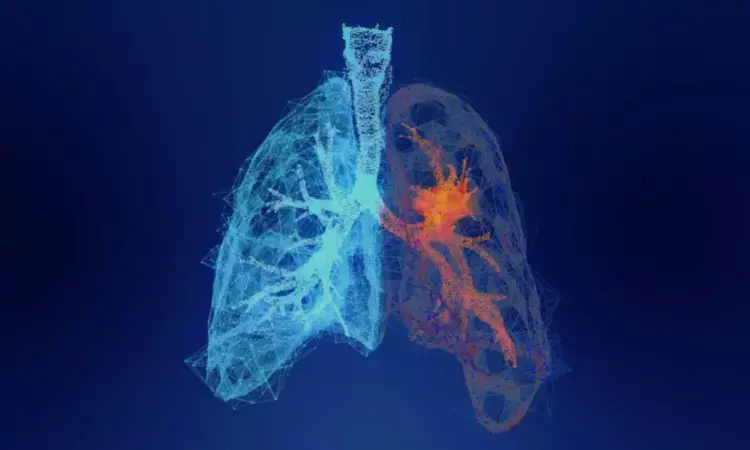- Home
- Medical news & Guidelines
- Anesthesiology
- Cardiology and CTVS
- Critical Care
- Dentistry
- Dermatology
- Diabetes and Endocrinology
- ENT
- Gastroenterology
- Medicine
- Nephrology
- Neurology
- Obstretics-Gynaecology
- Oncology
- Ophthalmology
- Orthopaedics
- Pediatrics-Neonatology
- Psychiatry
- Pulmonology
- Radiology
- Surgery
- Urology
- Laboratory Medicine
- Diet
- Nursing
- Paramedical
- Physiotherapy
- Health news
- Fact Check
- Bone Health Fact Check
- Brain Health Fact Check
- Cancer Related Fact Check
- Child Care Fact Check
- Dental and oral health fact check
- Diabetes and metabolic health fact check
- Diet and Nutrition Fact Check
- Eye and ENT Care Fact Check
- Fitness fact check
- Gut health fact check
- Heart health fact check
- Kidney health fact check
- Medical education fact check
- Men's health fact check
- Respiratory fact check
- Skin and hair care fact check
- Vaccine and Immunization fact check
- Women's health fact check
- AYUSH
- State News
- Andaman and Nicobar Islands
- Andhra Pradesh
- Arunachal Pradesh
- Assam
- Bihar
- Chandigarh
- Chattisgarh
- Dadra and Nagar Haveli
- Daman and Diu
- Delhi
- Goa
- Gujarat
- Haryana
- Himachal Pradesh
- Jammu & Kashmir
- Jharkhand
- Karnataka
- Kerala
- Ladakh
- Lakshadweep
- Madhya Pradesh
- Maharashtra
- Manipur
- Meghalaya
- Mizoram
- Nagaland
- Odisha
- Puducherry
- Punjab
- Rajasthan
- Sikkim
- Tamil Nadu
- Telangana
- Tripura
- Uttar Pradesh
- Uttrakhand
- West Bengal
- Medical Education
- Industry
AI analysis of PET/CT images can predict side effects of immunotherapy in lung cancer: Study

Dr. Watanabe and his teams from Niigata University have revealed that PET/CT image analysis using artificial intelligence (AI) can predict the occurrence of interstitial lung disease, known as a serious side effect of immunotherapy in lung cancer.
Immunotherapy has dramatically improved the treatment outcomes of primary lung cancer; however, it sometimes causes a serious side effect called interstitial lung disease. Interstitial lung disease is characterized by scarring (fibrosis) of the lungs and may be life-threatening owing to respiratory failure. Unfortunately, it is difficult to predict the occurrence of interstitial lung disease induced by immunotherapy. Accordingly, effective methods for predicting the risk of developing interstitial lung disease after immunotherapy are required.
This retrospective study investigated 165 patients with primary lung cancer who received immunotherapy at Niigata University Medical and Dental Hospital. As it is suggested that interstitial lung disease arises when inflammatory cells activated through immunotherapy damage healthy lung as well as cancer cells, the researchers hypothesized that patients with severe inflammation in healthy lungs prior to immunotherapy are more likely to develop interstitial lung disease after the treatment. Dr. Watanabe and his teams focused on PET/CT scan, a nuclear imaging test that is able to detect inflammation in the whole body. The researchers quantified the degree of inflammation in noncancerous lungs, namely lung regions without cancer, using AI analysis of PET/CT images. The study demonstrated that the risk of developing interstitial lung disease after immunotherapy is approximately 6.5 times higher in patients with high inflammation in the noncancerous lung than in those with low inflammation.
Dr. Yamazaki says "PET/CT is generally performed to detect cancer metastasis, but it would potentially be useful for estimating the risks of side effects associated with cancer treatment. The results of our study may not only help to predict the occurrence of interstitial lung disease after immunotherapy, but also to elucidate the mechanism of this serious side effect. We should conduct a multicenter prospective study for further investigation."
Reference:
Motohiko Yamazakia, Satoshi Watanabe, 18F-FDG-PET/CT Uptake by Noncancerous Lung as a Predictor of Interstitial Lung Disease Induced by Immune Checkpoint Inhibitors, Academic Radiology, DOI:10.1016/j.acra.2024.08.043.
Dr Kamal Kant Kohli-MBBS, DTCD- a chest specialist with more than 30 years of practice and a flair for writing clinical articles, Dr Kamal Kant Kohli joined Medical Dialogues as a Chief Editor of Medical News. Besides writing articles, as an editor, he proofreads and verifies all the medical content published on Medical Dialogues including those coming from journals, studies,medical conferences,guidelines etc. Email: drkohli@medicaldialogues.in. Contact no. 011-43720751


